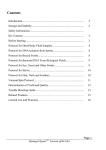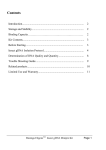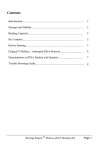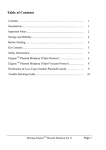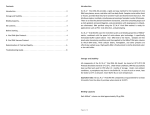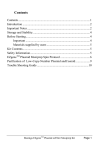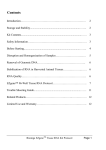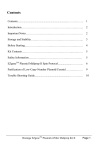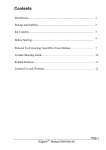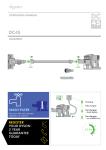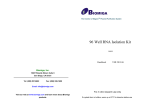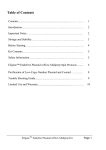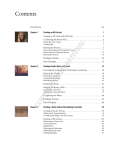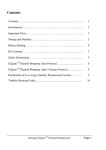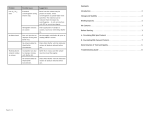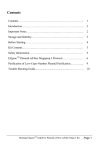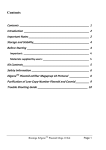Download Contents - Biomiga
Transcript
Contents Introduction......................................................................................... 2 Storage and Stability........................................................................... 2 Binding Capacity................................................................................ 2 Kit Contents........................................................................................ 3 Before Starting................................................................................... 3 EZgene™ Genomic DNA Miniprep Protocols: A. Tissue..................................................................................... 6 B. Cultured Cell.......................................................................... 9 C. Mouse Tails............................................................................ 11 D. Paraffin-embedded Tissue...................................................... 13 EZgene™ Vacuum/Spin Protocol...................................................... 14 Trouble Shooting Guide...................................................................... 15 Related Products……………………………………………………. 16 Page 1 Biomiga EZgene TM Tissue gDNA Miniprep Kit Introduction The EZgeneTM family of products is an innovative system that radically simplifies the extraction and purification of nucleic acids from a variety of sources. The key to this system is the new ezBindTM matrix that specifically, but reversibly, binds DNA or RNA under certain optimal conditions allowing proteins and other contaminants to be removed. Nucleic acids are easily eluted with deionized water or a low salt buffer. The EZgeneTM Tissue DNA Kit provides an easy and rapid method for the isolation of genomic DNA for consistent PCR and Southern analysis. Up to 30 mg of animal tissue, culture cells, mouse tail snips and paraffin-embedded tissue can be readily processed at a time. This kit allows for the single or multiple simultaneous processing of samples. There is no need for phenol/chloroform extractions, and time-consuming steps are eliminated (e.g. precipitation using isopropanol or ethanol). Purified DNA can be directly used for most applications such as PCR, Southern Blotting, and Restriction Enzyme Digestion. Storage and Stability All EZgene™ Tissue DNA Kit components are guaranteed for at least 12 months from the date of purchase when stored as follows: reconstituted Proteinase K -20°C, and all other materials at RT (22-25°C). Binding Capacity Each ezBindTM DNA mini column can bind approximately 100 µg DNA. Using greater than 30 mg tissue or 1x107 cells is not recommended. Page 2 Biomiga EZgeneTM Tissue gDNA Miniprep Kit Kit Contents Catalog# GD2211-00 GD2211-01 GD2211-02 Preps 4 50 250 ezBind DNA Mini Columns 4 50 250 collection tube 8 100 500 Buffer TL 1.2 mL 15 mL 70 mL Buffer BL 1.2 mL 15 mL 70 mL Buffer KB 2.4 mL 28 mL 135 mL DNA Wash Buffer** 2 mL 15 mL 3 x 24 mL Elution Buffer* 2 mL 15 mL 70 mL Proteinase K 3 mg 30 mg 5 x 30 mg User Manual 1 1 1 *Elution Buffer = 10 mM Tris-HCl, pH 8.5 **Add 8 mL (GD2211-00) or 60 mL (GD2211-01) or 96 mL (GD2211-02) absolute ethanol (96-100%) to each DNA Wash Buffer bottle before use. Safety Information Buffer BL contains Chaotropic salts. Use gloves and protective eyeware when handling this solution. Page 3 Biomiga EZgene TM Tissue gDNA Miniprep Kit Before Starting EZgeneTM Kits are designed to be simple, fast, and reliable provided that all steps are followed diligently. It is strongly advised that you familiarize yourself with the entire booklet before starting. Important Notes Reconstitute each vial of Protease K 110 μL (GD2211-00), 1.3 mL (GD221101), or 5 x 1.3 mL (GD2211-02) of Elution Buffer. Vortex the vial briefly before use. We recommend that you aliquot, and store vials of Proteinase K at -20°C. Bring Proteinase K solution to room temperature before use. Dilute DNA Wash Buffer with absolute ethanol as follows: Add 8 mL (GD2211-00) or 60 mL (GD2211-01) or 96 mL (GD2211-02) absolute ethanol (96-100%) to each bottle. Preheat Elution Buffer to 70°C (in aliquots of 0.5 mL/ sample). For Mouse Tail Protocol have the following ready: Pre-mixed solutions of 220 μL of Buffer BL and 220 μL of absolute ethanol (per sample). Mix by vortexing. They can be prepared fresh, or pre-made and stored at room temperature less than one month. Materials and Reagents to be supplied by user Tabletop microcentrifuge. Sterile 1.5 mL centrifuge tubes. Shaking water-bath set to 55°C for Tissue Protocol; 65°C for Cultured Cells; 55°C for Mouse Tail. RNase Stock Solution (100 mg/mL) (OPTIONAL). Absolute Ethanol (96-100%). PBS Buffer. Page 4 Biomiga EZgeneTM Tissue gDNA Miniprep Kit Determination of Yield and Quality The total DNA yield can be determined by a spectrophotometer using deionized water, Tris-HCl Buffer, or Elution Buffer as a blank. DNA concentration is calculated as: [DNA] = (Absorbance260) x (0.05 µg/µL) x (Dilution Factor) The quality of DNA can be assessed by measuring absorbance at both 260 nm and 280 nm. An A260/A280 ratio of 1.7-1.9 corresponds to 85%-95% purity. Expected yields vary with both amount and type of tissue used. Typically, 30 mg of fresh tissue will yield 10~40 µg of DNA with two elutions (each 200 µL). Concentrate DNA If necessary, the DNA can be concentrated as follows. Add sodium chloride to reach a final concentration of 0.1M followed by 2 x volume of absolute (96-100%) ethanol. Mix well and incubate at -20°C for 10 min. Centrifuge at 10,000 x g for 15 min and discard supernatant. Add 700 μL of 70% ethanol and centrifuge at 10,000 x g for 2 min. Discard supernatant, air dry the pellet for 2 min, and resuspend the DNA in 20 μL of sterile deionized water or 10 mM Tris-HCl, pH 8.5. Page 5 Biomiga EZgene TM Tissue gDNA Miniprep Kit A. EZgene™ Tissue Genomic DNA Miniprep Protocol This method is suitable for the isolation of genomic DNA from up to 30 mg of tissue. Yields vary depending on source. Optional: Although no mechanical homogenization of tissue is necessary, pulverizing the samples in liquid nitrogen will improve lysis and reduce incubation time. Once the liquid nitrogen has evaporated, transfer the powdered tissue into a clean 1.5 mL tube. Add 200 μL of Buffer TL and proceed to step 2 below. 1. Mince up to 20-30 mg tissue and place it into a 1.5 mL microtube. Add 200 μL Buffer TL. In order to speed up lysis, cut the tissue into small pieces. For samples more than 30 mg, simply scale up the volume of Buffer TL used. For example, 400 μL of Buffer TL should be used for 40-60 mg sample. 2. Add 25 μL reconstituted Proteinase K. Vortex to mix, and incubate in a shaking water bath set to 55°C to effectively complete lysis. If no shaking water-bath is available, vortex the sample every 20-30 min. Note: Lysis time depends on the amount and type of tissue used; average time is usually under 3 hours. One can allow lysis to proceed overnight. 3. Optional: Certain tissues such as liver tissue have high levels of RNA which will be co-purified with DNA using this kit. While it will not interfere with PCR, the RNA may be removed at this point. To do so, add 4 μL (assuming a sample size of 30 mg) RNase A (20 mg/mL) and incubate at room temperature for 2 min. Proceed with the tissue protocol. 4. Centrifuge for 5 min at ≥ 13,000 x g to pellet insoluble tissue debris. CAREFULLY aspirate the supernatant and transfer to a sterile microtube. 5. Add 220 μL Buffer BL. Vortex to mix. Incubate at 70°C for 10 min. Note: A wispy precipitate may form upon addition of Buffer BL, but does not interfere with DNA recovery. Adjust the volume of Buffer BL required based on the amount of starting material. 6. Add 220 μL Absolute Ethanol (96-100%, room temperature). Vortex to mix. Page 6 Biomiga EZgeneTM Tissue gDNA Miniprep Kit Note: Adjust the volume of ethanol required based on the amount of starting material. 7. Insert an ezBindTM DNA Mini Column into a 2 mL collection tube. Transfer the entire sample from step 6 into the column including any precipitate that may have formed. Centrifuge at 10,000 x g for 1 min. Discard the collection tube with flow-through liquid. 8. Place the DNA Mini Column into a new 2 mL collection tube and add 500 μL Buffer KB. Centrifuge at 10,000 x g for 1 min. Discard collection tube and flow-through liquid. 9. Place the DNA Mini Column into a new 2 mL collection tube. Add 650 μL DNA Wash Buffer. Centrifuge as above and discard flow-through liquid. Note: Ensure that absolute ethanol has been added to the DNA Wash Buffer before use. See label for directions. If refrigerated, DNA Wash Buffer must be brought to room temperature before use. 10. Using the same 2 mL collection tube, Add 650 μL DNA Wash Buffer. Repeat step 9. 11. Using the same 2 mL collection tube, and centrifuge with the lid open at maximum speed (≥ 13,000 x g) for 2 min to remove the residual ethanol. Note: This step is crucial for ensuring optimal elution. 12. Place the DNA Mini Column into a sterile 1.5 mL microtube, and add 100-200 μL preheated (70°C) Elution Buffer (10 mM Tris, pH8.5). Allow to sit at room temperature for 1-3 min. Centrifuge at ≥ 13,000 x g for 1 min. 13. Optional: Repeat the elution with a second 100-200 μL Elution Buffer. Note: Each 200 μL elution typically produces yields of 60-70% of the DNA bound to the column. Thus two elutions will generally give ~90% yields. However, increasing the elution volume will reduce the concentration of the final product. To obtain DNA at higher concentrations, elution can be carried out using 50-100 μL of Elution Buffer (which slightly reduces overall DNA yield). Volumes lower than 50 μL greatly reduce yields. In some instances, Page 7 Biomiga EZgene TM Tissue gDNA Miniprep Kit yields may be increased by incubating the column at 70°C (rather than at room temperature) upon the addition of Elution Buffer. Page 8 Biomiga EZgeneTM Tissue gDNA Miniprep Kit B. EZgene™ Cultured Cell Genomic DNA Miniprep Protocol This protocol is designed for the rapid isolation of up to 25 μg of genomic DNA from up to 5 x 106 cultured cells. 1. Prepare the cell suspension a. Frozen cell samples should be thawed before starting this protocol. Pellet the cells by centrifugation. Wash the cells with PBS, and resuspend cells with 200 μL Buffer TL. b. For cells grown in suspension, pellet 5 x 106 cells by spinning at 1,200 x g in a centrifuge tube. Discard the supernatant, and wash the cells once with PBS. Resuspend cells with 200 μL Buffer TL. c. For cells grown in a monolayer, harvest the cell by scraping with a rubber policeman. Wash cells twice, and resuspend cells with 200 μL Buffer TL. 2. Add 25 μL reconstituted Proteinase K. Vortex to mix well, and incubate in a 65°C shaking water-bath to complete lysis effectively. 3. OPTIONAL: Cultured cells have high levels of RNA which will be copurified with DNA using this kit. While it will not interfere with PCR, the RNA may be removed at this point. To do so, add 4 μL of RNase A (100 mg/mL) and incubate at room temperature for 2 minutes. 4. Add 220 μL Buffer BL and vortex to mix. Incubate at 70°C for 10 min. Note: A wispy precipitate may form upon addition of Buffer BL, but does not interfere with DNA recovery. 5. Add 220 μL Absolute Ethanol (96-100%, room temperature) and mix thoroughly by vortexing. 6. Insert an ezBindTM DNA Mini Column into a 2 mL collection tube. Transfer the entire sample from step 5 into the column including any precipitate that may have formed. Centrifuge at 10,000 x g for 1 min to bind DNA. Discard the collection tube with flow-through liquid. Page 9 Biomiga EZgene TM Tissue gDNA Miniprep Kit 7. Place the Mini Column into a new collection tube. Add 500 μL Buffer KB. Centrifuge at 10,000 x g for 1 min. Discard collection tube and flow-through liquid once again. 8. Place the Mini Column into a new collection tube. Add 650 μL DNA Wash Buffer diluted with absolute ethanol. Centrifuge as above and discard flowthrough liquid. Note: Ensure that ethanol has been added to DNA Wash Buffer. If refrigerated, DNA Wash Buffer must be brought to room temperature before use. 9. Using the same 2 mL collection tube. Add 650 μL DNA Wash Buffer, repeat Step 8. 10. Using the same 2 mL collection tube, centrifuge at a maximum speed (13,000 x g) for 2 min to remove the residual ethanol. Note: This step is crucial for ensuring optimal elution. 11. Place the ezBind DNA Mini Column into a sterile 1.5 mL microtube. Add 100200 μL preheated (70°C) Elution Buffer. Allow to sit at room temperature for 3 minutes. Centrifuge at 13,000 x g for 1 min. 12. Optional: Repeat the elution with a second 100-200 μL Elution Buffer. Note: Each 200 μL elution will typically produces yields of 60-70% of the DNA bound to the column. Thus two elutions will generally give ~90% yields. However, increasing the elution volume will reduce the concentration of the final product. To obtain DNA at higher concentrations, elution can be carried out using 50 μL -100 μL of Elution Buffer (which slightly reduces overall DNA yield). Volumes lower than 50 μL greatly reduce yields. In some instances yields may be increased by incubating the column at 70°C (rather than at room temperature) upon the addition of Elution Buffer. Page 10 Biomiga EZgeneTM Tissue gDNA Miniprep Kit C. EZgene™ Mouse Tail Genomic DNA Miniprep Protocol Bring frozen samples and Proteinase K solution to room temperature, and preheat aliquots of Elution Buffer (0.5 mL / sample) at 70°C. 1. Snip two pieces of mouse tail 0.2 - 0.5 cm in length. Place into a sterile 1.5 mL microcentrifuge tube, and add 180 μL Buffer TL. Note: If necessary cauterize the wound to stop bleeding. Having appropriately earmarked the animal, return it to a clean cage. Mice should not be older than 6 weeks, since lysis will be more difficult which results in suboptimal DNA yields. If possible, obtain a tail biopsy at 2-4 weeks and freeze samples at 70°C until DNA is extracted. 2. Add 25 μL reconstituted Proteinase K. Vortex to mix well, and incubate in a shaking water bath set to 55°C for 1-4 hours or until lysis is complete. If no shaking water-bath is available, vortex the sample every 20-30 min. Note: Incomplete lysis may block column flow and significantly reduce DNA yields. Incubation time for complete tail lysis is dependent on tail length, and animal age; 0.5 cm tail pieces from a 2-week old mice typically lyses in approximately 2 hours. For older animals an overnight incubation may improve yields. Bone and hair will not be lysed. 3. OPTIONAL: mouse tail snips have low levels of RNA which will be copurified with DNA using this kit. While it will not interfere with PCR, the RNA may be removed at this point. To do so, add 4 μL of RNase A (100 mg/mL) and incubate at room temperature for 2 minutes. Proceed with the following protocol. 4. Centrifuge for 5 min at 12,000 x g to pellet insoluble tissue debris and hair. CAREFULLY aspirate the supernatant, and transfer to a sterile 1.5 mL microtube, while leaving behind any insoluble pellet. 5. Add 1 volume Buffer BL followed by 1 volume Absolute Ethanol. Alternatively, user may add 2 volumes of premixed BL/ethanol mixture to the sample. Vortex thoroughly to mix. Thorough mixing is essential at this point. Page 11 Biomiga EZgene TM Tissue gDNA Miniprep Kit 6. Insert an ezBindTM DNA Mini Column into a 2 mL collection tube. Transfer the entire sample from Step 5 into the column including any wispy precipitate that may have formed. 7. Centrifuge at 10,000 x g for 1 min to bind DNA. Discard the collection tube with through liquid. 8. Place the Mini Column into a new collection tube. Add 500 μL Buffer KB. Centrifuge at 10,000 x g for 1 min. Discard collection tube the flow-through liquid. 9. Place the Mini Column into a new collection tube. Add 650 μL DNA Wash Buffer. Centrifuge at 10,000 x g for 1 min. Discard flow-through liquid Note: Ensure that absolute ethanol has been added to the DNA Wash Buffer before use. If refrigerated, DNA Wash Buffer must be brought to room temperature before use. 10. Using the same 2 mL collection tube, Add 650 μL DNA Wash Buffer, repeat step 9. 11. Using the same 2 mL collection tube, centrifuge with the lid open at maximum speed of 13,000 x g for 2 min to remove residual ethanol. Note: This step is crucial for ensuring optimal elution in the following step. 12. Place the Mini Column into a sterile 1.5 mL microtube, and add 100-200 μL of preheated (70°C) Elution Buffer. Allow to sit at room temperature for 3 minutes. Centrifuge at 13,000 x g for 1 min. 13. Optional: Repeat the elution with a second 100-200 μL Elution Buffer. Page 12 Biomiga EZgeneTM Tissue gDNA Miniprep Kit D. EZgene™ Paraffin-Embedded Tissue Genomic DNA Miniprep Protocol 1. Place no more than 30 mg of tissue (~2 mm3) in a clean 2 mL microtube. 2. Extract the sample with 1 mL xylene (not supplied) to remove the paraffin. Mix thoroughly by vortexing. 3. Centrifuge the tube at 10,000 x g at room temperature for 10 min. Discard the supernatant without disturbing the pellet. 4. Rinse the pellet with 1 mL Absolute Ethanol to remove any traces of xylene. Centrifuge at 10,000 x g for 5 min at room temperature. Discard the ethanol without disturbing the tissue pellet. 5. REPEAT the ethanol rinse. 6. Air dry the tissue pellet at 37°C for 15 min. 7. Add 200 µL Buffer TL to the tissue and then follow the standard Tissue DNA Isolation Protocol on page 6, starting with step 2 (using reconstituted Proteinase K). For DNA elution, we recommend using 50-100 μL of Elution Buffer warmed to 70°C. Yields will depend on size and age of sample. Certain samples may require prolonged lysis with Buffer TL. Tissue fixed with paraformaldehyde will yield degraded DNA or RNA. The extent of degradation depends on type of fixative used, but the size of DNA obtained is usually less than 500 bp. Degradation is not caused by the EZgene™ Tissue DNA Protocol. For PCR detection of segments smaller than 500 bp, satisfactory results can be obtained. Page 13 Biomiga EZgene TM Tissue gDNA Miniprep Kit EZgene™ Vacuum/Spin Protocol Carry out disruption, homogenization, protease digestion, and loading onto the ezBindTM DNA Mini Column as indicated in previous protocols. Instead of continuing with centrifugation, follow the steps outlined below. Note: Please read through previous sections of this book before beginning this protocol. 1. Prepare the vacuum manifold according to manufacturer’s instruction, and connect the ezBindTM DNA Spin Column to the manifold. 2. Load the sample onto the column. 3. Switch on vacuum to draw the sample through the column, and then turn off the vacuum. 4. Wash the column by adding 500 µL Buffer KB. Draw the liquid through the column by turning on the vacuum. 5. Wash the column by adding 650 µL DNA Wash Buffer. Draw the Wash Buffer through the column by turning on the vacuum source. 6. Washing the column with another 650 µL DNA Wash Buffer. 7. Place the column into a 2 mL collection tube, and transfer the column into a microcentrifuge. Spin for 2 min at 13,000 x g with the lid open to dry the column. 8. Place the column into a clean 1.5 mL microtube, and add 100-200 µL of preheated (70°C) Elution Buffer. Let it sit at room temperature for 1-2 min, and then centrifuge at 13,000 x g for 1 min to elute DNA. 9. Place the Mini Column into a sterile 1.5 mL microtube, and add 100-200 μL of preheated (70°C) Elution Buffer. Allow to sit at room temperature for 3 minutes. Centrifuge at 13,000 x g for 1 min. 10. Optional: Repeat the elution with a second 100-200 μL Elution Buffer. Page 14 Biomiga EZgeneTM Tissue gDNA Miniprep Kit Trouble Shooting Guide Problem Clogged Column Possible reason Suggested improvement Incomplete Lysis Extend incubation time of lysis with Buffer TL, and Proteinase K. Add the correct volume of Buffer BL and incubate for specified time at 70°C. It may be necessary to extend incubation time by 10 min. If using more than 30 mg tissue, increase volumes of Sample is too Large Proteinase K, Buffer TL, Buffer BL, and ethanol. Pass aliquots of lysate through one column successively. Sample viscous Low DNA Yield Low A260/A280 ratio is too Divide sample into multiple tubes, and adjust the volume to 25 µL with Buffer TL. Clogged Column See above Poor elution Repeat elution or increase elution volume (see notes on elution, at the end of each protocol). Incubation of column at 70°C for 5 min with Elution Buffer may increase yields. Improper washing DNA Wash Buffer must be diluted with absolute (96100%) ethanol as specified on page 4 before use. Culture overgrown Overgrown culture contains lysed cells and degraded DNA. Do not grow cell for longer than 16 hours. Sample has DNA content Increase starting material and volume of all reagents low (Proteinase K, Buffer TL, Buffer BL, and ethanol) proportionally. Pass aliquots of lysate through column successively. Extended centrifugation during elution Resin from the column may be present in eluate. Avoid centrifugation at speeds higher than specified. The material can be removed from the eluate by centrifugation-it will not interfere with PCR or restriction digests. Poor cell lysis due Repeat the procedure, this time making sure to vortex the to incomplete sample with Buffer BL immediately and completely. mixing with Buffer BL Incomplete cell Increase incubation time with Buffer TL, and Proteinase K. lysis or protein Ensure that no visible pieces of tissue remain. degradation due to insufficient incubation Page 15 Biomiga EZgene TM Tissue gDNA Miniprep Kit Related EZgeneTM Products Catalog # Product Name Preps Price $ GD2211-01 Tissue gDNA kit 50 90.00 GD2211-02 Tissue gDNA kit 250 420.00 GD2814-01 96-well tissue gDNA kit 4x96 680.00 GD2814-02 96-well tissue gDNA kit 20x96 3000.00 GD2311-01 Blood gDNA mini kit 50 90.00 GD2311-02 Blood gDNA mini kit 250 420.00 GD2312-01 Blood gDNA midi kit 10 90.00 GD2312-02 Blood gDNA midi kit 25 200.00 GD2314-01 Blood gDNA maxi kit 10 160.00 GD2314-02 Blood gDNA maxi kit 25 360.00 GD2815-01 96-well blood gDNA kit 4x96 680.00 GD2815-02 96-well blood gDNA kit 20x96 3000.00 GD2411-01 Bacterial gDNA kit 50 110.00 GD2411-02 Bacterial gDNA kit 250 495.00 GD2412-01 Soil gDNA kit 50 90.00 GD2412-02 Soil gDNA kit 250 420.00 GD2413-01 Insect gDNA kit 50 90.00 GD2413-02 Insect gDNA kit 250 420.00 GD2415-01 Yeast gDNA kit 50 90.00 GD2415-02 Yeast gDNA kit 250 420.00 GD2416-01 Fungal gDNA kit 50 90.00 GD2416-02 Fungal gDNA kit 250 420.00 Page 16 Biomiga EZgeneTM Tissue gDNA Miniprep Kit
















